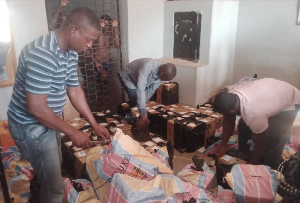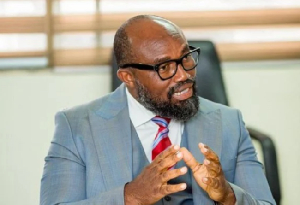"The government needs to take strong action to combat the corruption and secrecy that undermine Angolans' rights" - Arvind Ganesan, Director of the Business and Human Rights Program at Human Rights Watch.
It is a total digression from reality to assume that natural resource abundance is a distinctive advantage in the process of economic growth and development. It is a fact that resource rich countries in the African region especially have nothing special to boast of in terms of development of which Ghana is no exception. Again, it is not far from right to say that the documented phenomenon in literature -the “resource curse”- continues to assume scary dimensions in oil-producing economies. Countries including Gabon, Nigeria, Angola, Equatorial Guinea, come in to fit in the awful pronouncements of the “Paradox of Plenty”.
In another strand of the resource curse literature, raises the critical issue of secrecy in contract dealings. The secrecy that surrounds contracts in the extractive industries remains ostensibly the single most potent force that triggers anomalies and the unexpected. The commitment of Ghana in applying the processes of the Extractive Industries Transparency Initiative (EITI) in the oil and gas sector can never be underestimated. The country is even more optimistic with the recent extension of the deadline for the completion of the reporting and validation processes for a “compliant” status by the EITI International Board in their meeting in Berlin. These and others constitute the contemporary modalities in Ghana’s transparency initiatives.
Meanwhile, in the face of the mounting calls for comprehensive transparency, focus has been shifted from opacity that surrounds contract dealings in both the mining and the oil sector due to its sensitivity and difficulties. Contract transparency is candidly the most controversial issue to deal with in the bid to break the resource curse and ensure that oil revenues trickle down to profit all people.
This article seeks to reflect on the two sides of whether or not contract transparency should be actualized by action in Ghana especially considering the worst excesses of contract secrecy in certain countries including Liberia and Sudan. Do we really want the best out of EITI? And would Ghana’s transparency be comprehensive enough to exact gains considering the secrecy of contracts in the mining and oil sectors?
The Case Demystified
It is significantly argued that contract transparency remains a fundamental proportion in the modalities of transparency in the extractive industries. Contract secrecy is known to be the major cause of renegotiations, mistrusts and tensions that tend to suspend the development aspirations of many resource-rich countries. A typical example is the renegotiated Liberia-Mittal Steel Mineral Development Agreement (MDA) of 2006.
From the foregoing, it goes without saying that Ghana’s “Model” of transparency is very uncertain when contracts with multinational mining and oil companies remain secret. Ideally, the country cannot claim to be an upholder of transparency when its people still have no idea of the clauses contained in contracts signed on their behalf.
It is worthy of note that the International Monetary Fund has endorsed contract transparency as key to the good governance of extractives (IMF Guide on Resource Revenue Transparency, 2007 cited in Contracts Confidential: Ending Secret Deals in the Extractive Industries by Peter Rosenblum and Susan Maples). It is therefore undemocratic to keep contracts secret. Contract secrecy limits the ability of freedom of information that exists in Ghana. By virtue of that fact that Ghana claims to be the beacon of democracy and stronghold of the rule of law, there should be a critical considerable of this contradictions in governance. In fact, it is the people’s fundamental right to know the activity that affects their livelihoods especially with environmental protection and mitigation measures and sections of land use enshrined in contracts. People and local communities are also displaced as part of contract clauses they have not seen.
The case of high-profile corruption even makes the case for contract transparency legitimate and more urgent than ever. There is no doubt that contract transparency would extirpate provisions in contracts that are potential products of corruption. The massive cases of corruption in Gabon, Equatorial Guinea, Nigeria and other oil-producing countries is partly blamed on the attitude of making contracts secret.
Ghana can avoid contract renegotiations as its happening in other countries only if it does not make contract secrecy sacred. Contract opened to all have the propensity to provide a level playing field where ordinary citizens and companies all benefit.
Though, the argument for contract secrecy which revolves around the fact that there is the need to protect commercially sensitive information is legitimate to companies and governments, there is no reason to disregard exposing contracts for natural resources that are owned by citizens. In contract transparency, citizens are suitably placed to monitor compliance regarding the effective enforcement of contracts and legal and regulatory frameworks. What remains unfortunate is that contracts signed do not affect those involved but go to affect the innocent people in the hinterlands that already reel under the threats of chronic poverty. The modalities of transparency in Ghana’s extractive industry are the secrecies that are evident in contracts, revenue payments and mining concessions. Contract openness should be the significant thread in the fabric of transparency being sought for in the oil and gas sector. Else Ghana’s transparency would continue to be lopsided and deficient in its application to quell corruption and ensure equitable distribution of oil wealth.
The Ideal Situation for Ghana
What Ghana should know is that it has nothing so exceptional to defeat the resource curse. Abiding by these little but important issues would increase her ability to make oil revenues beneficial to all people. We have a lot to learn from Liberia and Sudan. Assessing the situation in the worse light, increasing commitment to contract secrecy could spell troubles for the country’s extractive industry. There should therefore be no room for contracts confidential that undermine human rights.
Conclusion
The asymmetry of information available in extractive industries simply makes the acclaimed good governance of Ghana weak. I strongly believe that the call for the passage of the Freedom of Information bill should move together with the readiness of the state to expose contracts to transparency. The Ghana Extractive Industries Transparency Initiative Secretariat, Minerals Commission, civil society organizations and other organizations should as a matter of importance increase their voices and pressure the government to make open contracts in the extractive industries. Making information open is a basic tenet of rule of law the country strongly believes in. It is simply undemocratic to conclude contracts without transparency. In our bid to exhibit good governance in the extractive industry which is being used by the IMF, Ghana cannot ignore the importance of contract transparency.
The author, Stephen Yeboah is at the Department of Planning, KNUST, Kumasi-Ghana [email: stephenyeboah110@yahoo.com]
Opinions of Tuesday, 20 April 2010
Columnist: Yeboah, Stephen














